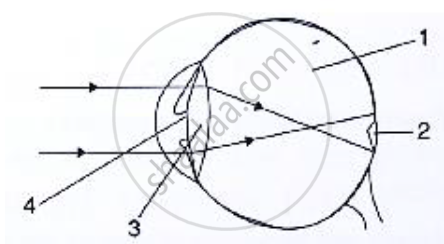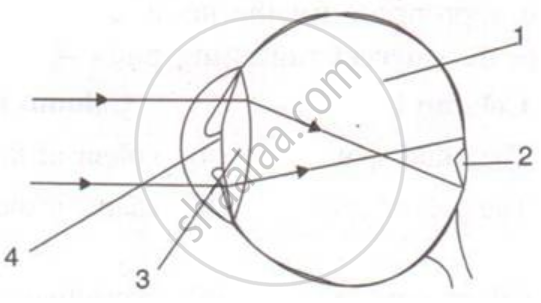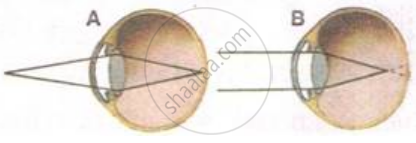Advertisements
Advertisements
Question
Due to elongation of _______ and increase in curvature of the eye lens, a person cannot see distant objects clearly.
Options
eyeball
pupil
eyelid
cornea
Solution
Due to elongation of eyeball and increase in curvature of the eye lens, a person cannot see distant objects clearly.
APPEARS IN
RELATED QUESTIONS
List three common refractive defects of vision. Suggest the way of correcting these defects.
A person with a myopic eye cannot see objects beyond 1.2 m distinctly. What should be the type of the corrective lens used to restore proper vision?
What is the far point and near point of the human eye with normal vision?
The far point of a myopic person is 80 cm in front of the eye. What is the nature and power of the lens required to correct the problem?
The kind of lens required to correct Myopia
A student is unable to see clearly the words written on the black board placed at a distance of approximately 3 m from him. Name the defect of vision the boy is suffering from. State the possible causes of this defect and explain the method of correcting it.
Name the defect of vision in a person:
whose near point is more than 25 on away.
What is the other name for
hypermetropia
What is the scientific name of
short-sightedness
Name the body part with which the terms myopia and hypermetropia are connected.
Your friend can read a book perfectly well but cannot read the writing on blackboard unless she sits on the front row in class.
What type of lenses-converging or diverging-would an optician prescribe for her?
A man can read the number of a distant but clearly but he finds difficulty in reading a book.
From which defect of the eye is he suffering?
A man can read the number of a distant but clearly but he finds difficulty in reading a book.
What type of spectacle lens should he use to correct the defect?
Name the defect of vision which can be corrected by a converging lens. Show clearly by a ray diagram how the lens corrects the defect.
Explain with the help of labelled ray diagram, the defect of vision called myopia and how it is corrected by a lens.
An eye has a far point of 2 m. What type of lens in spectacles would be needed to increase the far point to infinity? Also calculate the power of lens required. Is this eye long-sighted or short-sighted?
A short-sighted person has a near point of 15 cm and a far point of 40 cm.
(a) Can he see clearly an object at a distance of:
(i) 5 cm?
(ii) 25 cm?
(iii) 50 cm?
(b) To see clearly an object at infinity, what kind of spectacle lenses does he need?
A person can read a book clearly only if he holds it at an arm's length from him. Name the defect of vision:
if the person is a young man
Differentiate between members of the following pair with reference to what is asked in bracket.
Myopia and hyperopia (cause of the defect)
Explain the terms ‘adaptation’ and ‘accommodation’ with reference to the eye.
Given below is a diagram depicting a defect of the human eye. Study the same and answer the question that follow:

Name the defect shown in the diagram.
An old man cannot see objects closer than 1 m from the eye clearly. Name the defect of vision he is suffering from. How can it be corrected? Draw ray diagram for the (i) defect of vision and also (ii) for its correction.
Observer the following diagram and answer the questions.
a) Which eye defect is shown in this diagram?
b) What are the possible reasons for this eye defect?
c) How this defect is corrected, write it in brief?

A student has difficulty reading the blackboard while sitting in the last row. What could be the defect the child is suffering from? How can it be corrected?
State the main functions of the following:
Tears
Name the following:
The photosensitive pigment present in the rod cells of the retina.
Select the odd one in the following series:
Endolymph, Tympanic membrane, Semi-circular canal, Blind spot.
Write whether the following is true or false:
A convex lens is used for correcting myopia.
Choose the correct answer :
Presbyopia is a disease of _____________
Given below is a diagram depicting a defect of the human eye? Study the same and answer the question that follow:

Give two possible reasons for this defect of the eye in human beings.
Have a look at the posture of this woman who is reading a book and answer the questions which follow:

What kind of looking glasses she needs?
Rewrite the following table so as to match second and third column with first column.
|
Column I
|
Column II
|
Column III
|
|
(i) Myopia
|
Old age problem
|
Bifocal lens
|
|
(ii) Presbyopia
|
Nearsightedness
|
Concave lens.
|
A person is unable to see objects distinctly placed within 50 cm from his eyes.
(a) Name the defect of vision the person is suffering from and list its two possible causes.
(b) Draw a ray diagram to show the defect in the above case.
(c) Mention the type of lens used by him for the correction of the defect and calculate its power. Assume that the near point for the normal eye is 25 cm.
(d) Draw a labeled diagram for the correction of the defect in the above case.
In what two whys is a yellow spot different from the blind spot?
Mention, if the following statement is True or False
Hypermetropia is a defect of the eye caused due to the eyeball elongation
Assertion: Myopia is the defect of vision in which a person cannot see distant objects clearly.
Reason: This due to eye-ball being too short.
A person is unable to see clearly a poster fixed on a distant wall. He however sees it clearly when standing at a distance of about 2 m from the wall.
- Draw ray diagram to show the formation of image by his eye lens when he is far away from the wall.
- List two possible reasons of this defect of vision.
- Draw ray diagram to show the correction of this defect using appropriate lens.
Name the following:
Two kinds of accomodations.
